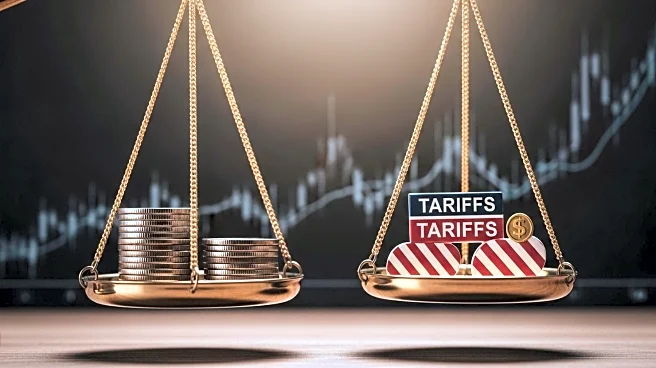What's Happening?
Goldman Sachs economists have projected that US consumers will absorb 55% of the costs associated with President Trump's tariffs by the end of the year. The analysis, detailed in an October 12 research note, indicates that American companies will take on 22% of the tariff costs, while foreign exporters will absorb 18% by reducing their prices. The remaining 5% of costs are expected to be evaded. The tariffs, part of Trump's strategy to close trade gaps and boost domestic manufacturing, have already increased core personal consumption expenditure prices by 0.44% this year, with inflation expected to reach 3% by December. Despite Trump's assertions that trading partners bear the tariff costs, the levies are paid by American importers, leading to higher consumer prices.
Why It's Important?
The impact of tariffs on consumer prices is significant as it directly affects the cost of goods for American households, potentially leading to increased inflation. This situation could strain consumer budgets and alter spending habits, affecting economic growth. Businesses may face challenges in maintaining profit margins as they balance absorbing costs and passing them onto consumers. The broader economic implications include potential shifts in trade dynamics and manufacturing strategies, as companies navigate the financial pressures of tariffs. The situation underscores the complexities of trade policies and their ripple effects on the economy.
What's Next?
The future of tariff rates remains uncertain, with potential changes depending on ongoing trade negotiations and political decisions. Companies may continue to adjust pricing strategies in response to tariff impacts, while consumers could face further price increases. The economic landscape may see shifts in manufacturing and import strategies as businesses seek to mitigate tariff costs. Stakeholders, including policymakers and industry leaders, will likely monitor the situation closely, considering potential adjustments to trade policies and economic strategies.
Beyond the Headlines
The tariff situation raises ethical considerations regarding the fairness of burden distribution among consumers, businesses, and foreign exporters. It also highlights the legal complexities of international trade agreements and the potential for long-term shifts in global commerce. Cultural dimensions may emerge as consumer preferences evolve in response to price changes, influencing market trends and product demand.









